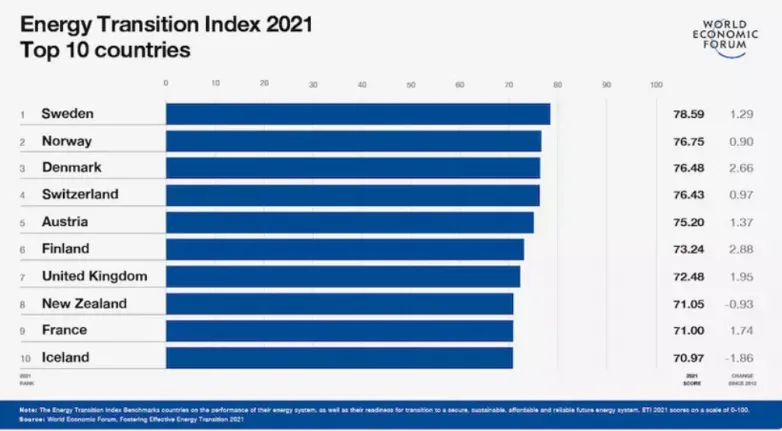Global energy transition 'requires to enhance momentum' to get to climate goals
- Despite lots of net-zero targets being introduced and also deployment of renewable resource ramping up worldwide over the past year, just 10% of nations have revealed "stable and also constant" progression in their energy transition plans, according to a new report from the World Economic Forum (WEF).

WEF stated in its most current Energy Transition Index (ETI) that the global initiative to transfer to clean energy resources "requires to enhance its energy" in order to fulfill targets laid out in the Paris Agreement and also UN's Sustainable Development Goals.
The WEF's report lays out an annual score-card that assesses economic gains, ecological sustainability as well as dependable energy networks to "benchmark" nations' efficiency as they work towards a decarbonised system.
It stated that, although the global standard of ETI scores has increased in 8 out of the last ten years, just 13 nations out of 115 assessed have made "constant gains" since 2011, as well as just 68 boosted their rating by greater than two portion factors over the past decade.
This, WEF claimed, reveals the "fundamental intricacy of the energy transition difficulty".
Nordic countries Sweden, Norway and also Denmark preserved their settings as the three highest-performers in the transition index, driven by "strong development" in ecological sustainability, it said, including that all 10 of the world's leading economic situations have actually made "solid renovations" because location, particularly in decarbonising their energy networks.
Nonetheless, Roberto Bocca, WEF's head of energy and materials, stated that "rate as well as resilience" have to be an essential focus of the energy transition as countries take more activity to decrease their carbon emissions.
" With the energy transition relocating beyond the low dangling fruit, sustained step-by-step progression will certainly be a lot more challenging as a result of the progressing landscape of threats to the energy transition.".
The sentiment of WEF's report mirrors those of renewables trade bodies such as the Global Solar Council, which required a "feeling of necessity" this year to increase the energy transition. Similarly, DNV GL stated last September that the global press to take on renewable energy sources and relocate far from fossil fuels is "no place close to fast sufficient" to fulfill the targets set out in the Paris Agreement. Just last month, think tank Ember alerted that the world's transition from coal power is moving "far also slowly to stay clear of the environment dilemma", noting that the world generated a lot more electricity from fossil fuels last year than in 2015.
This is despite the fact that more investments were made into clean energy initiatives last year than every previously, with global energy transition funding getting to US$ 500 billion for the very first time, according to BloombergNEF.
The WEF mentioned that, while decarbonisation is progressing in Nordic nations as well as in economically created countries such as the US, Japan as well as UK, only three participants of the G20 nations that sit in the top 20 of the ETI ranking system. At the same time, some countries' energy mixes have actually enhanced in carbon intensity over the past decade, especially in "many arising economies in Asia and also sub-Saharan Africa".
Stephanie Jamison, a senior taking care of director at Accenture, which partnered with WEF to create the report, stated that grid strength will be essential for the global transition to environment-friendly energy.
" The role of electrical power in the energy system will enhance significantly by 2050, which is a huge improvement," she claimed.
" While it is excellent to see renewable energy resources more powerful coming out of COVID, there is still a lot even more work to do to more development the shift to net-zero carbon energy and make sure buy-in from a wide collection of stakeholders.".
Also read

